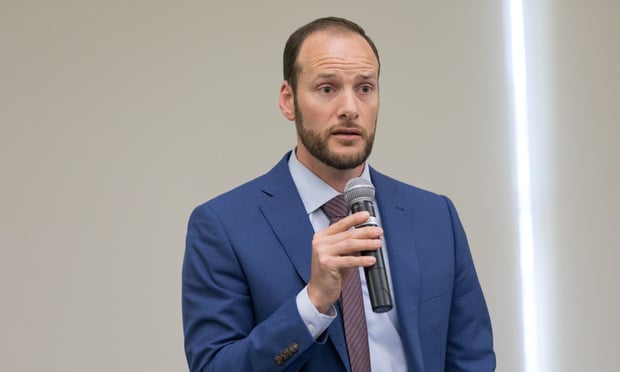In Latest Case of California Officials Coming Down on Gig Companies, SF DA Hits DoorDash With Worker Misclassification Suit
San Francisco District Attorney Chesa Boudin on Tuesday announced an employee protection and unfair business practices action against DoorDash. The suit comes a little over a month after the state's attorney general and city attorneys in LA, SF and San Diego sued Uber and Lyft bringing misclassification claims and less than a week after a California regulator found the ride-sharing companies' drivers were employees.
June 16, 2020 at 04:06 PM
5 minute read
 San Francisco Deputy Public Defender Chesa Boudin, a proponent of reforming San Francisco's cash bail system, said, "A client once told me that it's easier to get high than to get help in the City." (Photo: Jason Doiy/ALM)
San Francisco Deputy Public Defender Chesa Boudin, a proponent of reforming San Francisco's cash bail system, said, "A client once told me that it's easier to get high than to get help in the City." (Photo: Jason Doiy/ALM)
San Francisco's district attorney has joined a growing chorus of California regulators and enforcement officials taking aim at gig economy companies for what they see as the misclassification of workers as contractors.
District Attorney Chesa Boudin on Tuesday announced a lawsuit against delivery company DoorDash and that his office would be seeking a court order finding that the company should be treating its couriers as employees.
"It shouldn't require that. It shouldn't be necessary. But sadly we know that it is," Boudin said in a press conference announcing the lawsuit.
In a prepared statement Max Rettig, DoorDash's global head of public policy said that during the pandemic the company has allowed Californians from all walks of life to find flexible earnings opportunities averaging a few hours a week.
"Today's action seeks to disrupt the essential services Dashers provide, stripping hundreds of thousands of students, teachers, parents, retirees and other Californians of valuable work opportunities, depriving local restaurants of desperately needed revenue, and making it more difficult for consumers to receive prepared food, groceries, and other essentials safely and reliably," Rettig said. "We will fight to continue providing Dashers the flexible earning opportunities they say they want in these challenging times."
The district attorney's action comes less than a week after the California Public Utilities Commission found that drivers working for Uber Technologies Inc. and Lyft Inc. should be classified as employees under California law.
It also follows another high-profile lawsuit filed last month against Uber and Lyft by California's attorney general and the city attorneys of Los Angeles, San Diego and San Francisco claiming that the companies misclassify drivers as contractors, allowing the companies to avoid millions of dollars in payroll taxes and skirt the responsibility to provide drivers benefits like health care, minimum wage and reimbursement for expenses. In that suit, Uber is represented by counsel at Gibson, Dunn & Crutcher, and Lyft is represented by Keker, Van Nest & Peters. Before the recent wave of government enforcement actions, both firms frequently represented gig companies in worker misclassification lawsuits brought on behalf of private plaintiffs.
The district attorney's office suit against DoorDash claims that the company's couriers, or "Dashers" in the parlance of the delivery company, are central to the business.
"Dashers do no perform work that is merely incidental to the company's business," the local prosecutors wrote. "Quite the opposite, "Dashers' deliveries are integral to DoorDash's business and their work is a regular and continuing par of the business."
Boudin announced Tuesday's lawsuit during a Zoom news conference alongside assistant district attorney Scott Stillman, the lead prosecutor on the case who joined the DA's office after practicing as plaintiff-side labor and employment partner at the Law Offices of McGuinn, Hillsman & Palefsky in San Francisco, and California Assemblywoman Lorena Gonzalez, the author and sponsor of Assembly Bill 5, the state law passed last year codified the worker classification test laid out by the California Supreme Court in Dynamex Operations West v. Superior Court. The state law ensures access to paid sick leave, disability, family leave and unemployment insurance for workers who should be qualified as employees under the so-called ABC test.
Stillman, who was brought into the office to head its new crimes against workers unit, said Tuesday that he hoped the office's action against DoorDash would cause other companies to take a look at their own practices and make adjustments accordingly.
"We hope that they do so voluntarily so that we don't have to be here in the future related to other companies," he said.
Boudin, however, said that he anticipated that Tuesday's action would be the "first of many" of its kind.
Read more:
Gig-Worker Classification in the Age of COVID-19
'Their Day in Arbitration': Judge Compels Mass Arbitration Against DoorDash
This content has been archived. It is available through our partners, LexisNexis® and Bloomberg Law.
To view this content, please continue to their sites.
Not a Lexis Subscriber?
Subscribe Now
Not a Bloomberg Law Subscriber?
Subscribe Now
NOT FOR REPRINT
© 2025 ALM Global, LLC, All Rights Reserved. Request academic re-use from www.copyright.com. All other uses, submit a request to [email protected]. For more information visit Asset & Logo Licensing.
You Might Like
View All
Willkie Farr & Gallagher Drives Legal Challenge for Uber Against State's Rideshare Laws
5 minute read
'Ice Pop,' 'Meta Moon,' 'Blue Raspberry': Tracked Drink Flavor Searches Fail in Privacy Suit
4 minute read
How We Won: BraunHagey’s $56M Trademark Win Over Molson Coors Upheld by 9th Circuit
8 minute readLaw Firms Mentioned
Trending Stories
- 1South Florida Attorney Charged With Aggravated Battery After Incident in Prime Rib Line
- 2'A Death Sentence for TikTok'?: Litigators and Experts Weigh Impact of Potential Ban on Creators and Data Privacy
- 3Bribery Case Against Former Lt. Gov. Brian Benjamin Is Dropped
- 4‘Extremely Disturbing’: AI Firms Face Class Action by ‘Taskers’ Exposed to Traumatic Content
- 5State Appeals Court Revives BraunHagey Lawsuit Alleging $4.2M Unlawful Wire to China
Who Got The Work
J. Brugh Lower of Gibbons has entered an appearance for industrial equipment supplier Devco Corporation in a pending trademark infringement lawsuit. The suit, accusing the defendant of selling knock-off Graco products, was filed Dec. 18 in New Jersey District Court by Rivkin Radler on behalf of Graco Inc. and Graco Minnesota. The case, assigned to U.S. District Judge Zahid N. Quraishi, is 3:24-cv-11294, Graco Inc. et al v. Devco Corporation.
Who Got The Work
Rebecca Maller-Stein and Kent A. Yalowitz of Arnold & Porter Kaye Scholer have entered their appearances for Hanaco Venture Capital and its executives, Lior Prosor and David Frankel, in a pending securities lawsuit. The action, filed on Dec. 24 in New York Southern District Court by Zell, Aron & Co. on behalf of Goldeneye Advisors, accuses the defendants of negligently and fraudulently managing the plaintiff's $1 million investment. The case, assigned to U.S. District Judge Vernon S. Broderick, is 1:24-cv-09918, Goldeneye Advisors, LLC v. Hanaco Venture Capital, Ltd. et al.
Who Got The Work
Attorneys from A&O Shearman has stepped in as defense counsel for Toronto-Dominion Bank and other defendants in a pending securities class action. The suit, filed Dec. 11 in New York Southern District Court by Bleichmar Fonti & Auld, accuses the defendants of concealing the bank's 'pervasive' deficiencies in regards to its compliance with the Bank Secrecy Act and the quality of its anti-money laundering controls. The case, assigned to U.S. District Judge Arun Subramanian, is 1:24-cv-09445, Gonzalez v. The Toronto-Dominion Bank et al.
Who Got The Work
Crown Castle International, a Pennsylvania company providing shared communications infrastructure, has turned to Luke D. Wolf of Gordon Rees Scully Mansukhani to fend off a pending breach-of-contract lawsuit. The court action, filed Nov. 25 in Michigan Eastern District Court by Hooper Hathaway PC on behalf of The Town Residences LLC, accuses Crown Castle of failing to transfer approximately $30,000 in utility payments from T-Mobile in breach of a roof-top lease and assignment agreement. The case, assigned to U.S. District Judge Susan K. Declercq, is 2:24-cv-13131, The Town Residences LLC v. T-Mobile US, Inc. et al.
Who Got The Work
Wilfred P. Coronato and Daniel M. Schwartz of McCarter & English have stepped in as defense counsel to Electrolux Home Products Inc. in a pending product liability lawsuit. The court action, filed Nov. 26 in New York Eastern District Court by Poulos Lopiccolo PC and Nagel Rice LLP on behalf of David Stern, alleges that the defendant's refrigerators’ drawers and shelving repeatedly break and fall apart within months after purchase. The case, assigned to U.S. District Judge Joan M. Azrack, is 2:24-cv-08204, Stern v. Electrolux Home Products, Inc.
Featured Firms
Law Offices of Gary Martin Hays & Associates, P.C.
(470) 294-1674
Law Offices of Mark E. Salomone
(857) 444-6468
Smith & Hassler
(713) 739-1250







